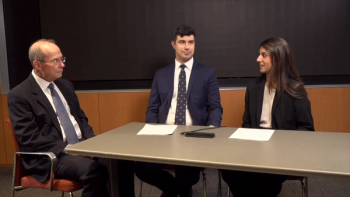
ASCRS 2024: Tackling unconscious gender bias in ophthalmology, industry, and medicine
Neda Nikpoor, MD, urges audience members to become more empowered in making small but meaningful, evidence-based changes in combating unconscious gender bias.
Neda Nikpoor, MD, spoke with Ophthalmology Times about her role in an ASCRS course where she explained that simple, evidence-based, and practical techniques are possible to tackle unconscious gender bias and improve gender equality.
Video Transcript
Editor’s note - The following transcript has been lightly edited for clarity.
Neda Nikpoor, MD:
Hi, my name is Neda Nikpoor. I am a cornea, cataract, and refractive surgeon in Honolulu, Hawaii. I had the honor of helping to lead a course with my close friends and colleagues, Tanya Trinh, FRANZCO, MBBS; Arthur B. Cummings, MD; Julie Schallhorn, MD; and Brett H. Mueller II, DO, PhD. Our course was about addressing unconscious gender bias in ophthalmology and in our world.
I'll be honest, when I first got assigned this topic by my dear friend, Tanya Trinh, I didn't really know that I understood what unconscious gender bias was. I would like to invite you to explore this topic. We all have biases. The ones that are the hardest to address are the biases that are unconscious, we're not even aware of them. And there's tons of literature out there on the impact of this unconscious bias in our society, and in our field, and in medicine, and in ophthalmology.
For example, in the general world, one of the examples of this is bathroom design. If you have 100 square feet allocated to the men's bathroom, and 100 square feet allocated to the women's bathroom, there's going to be a long line on the women's side. Even though it's equal, it may not be equitable. And so you lead to inequities in the way that women and men experience the world from something that was unintentional. This is very distinct from like sexual harassment or something like that, which is intentional aggression.
This is unconscious. It's no one's fault. It's not something we're aware of. Women are also responsible for this. There's things that we just don't even consider.
So my part that I talked about was the impact of this unconscious gender bias in ophthalmology specifically. And there are so many papers, and so many really excellent studies that show at every level, medical school, residency, and in the real world in our jobs what this unconscious bias can lead to.
I think the biggest one for people to be aware of is that there is a pay gap in our world. For all fields, a woman makes 84 cents per dollar that a man makes women physicians make 74 cents for every dollar that a man makes. Some of the things that lead to this are actually a result of unconscious decisions like women being more likely to choose primary care and lower paying specialties. It's not because women are taking off to take care of their children and they're working part time. The data is there that even for equal work for full-time, year-round work, women still make less than men. And there's so many examples I could go on and on and on.
I just want to say that this isn't about shaming men or our society or anything or assigning any kind of blame. It's just about raising awareness. Because if we're not aware of our biases, we can't do anything to control them. The whole point of our course was to shed light on some of these biases, and invite a dialogue and an open conversation about it.
I hope that this at least sparks your curiosity. There's tons of data. There's amazing organizations like WIO and OWL, and Bonnie Henderson has a great meeting, EnVision Summit. There's so many ways that you can learn about this.
Thank you for being open minded and looking into this and introspecting a little bit in your own lives into what some of your own unconscious biases are.
Newsletter
Don’t miss out—get Ophthalmology Times updates on the latest clinical advancements and expert interviews, straight to your inbox.





























